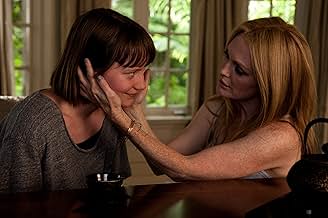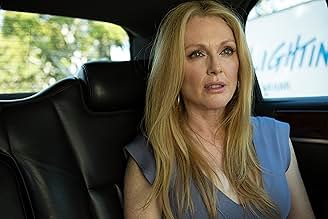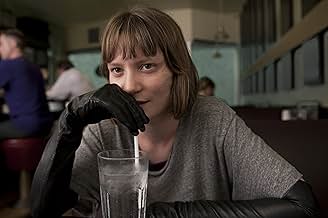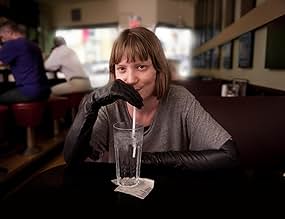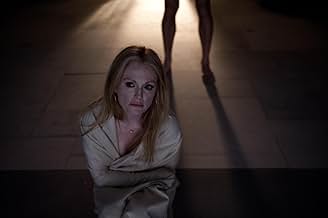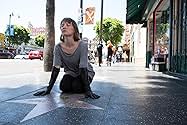IMDb रेटिंग
6.2/10
44 हज़ार
आपकी रेटिंग
अपनी भाषा में प्लॉट जोड़ेंA tour into the heart of a Hollywood family chasing celebrity, one another and the relentless ghosts of their pasts.A tour into the heart of a Hollywood family chasing celebrity, one another and the relentless ghosts of their pasts.A tour into the heart of a Hollywood family chasing celebrity, one another and the relentless ghosts of their pasts.
- पुरस्कार
- 10 जीत और कुल 24 नामांकन
फ़ीचर्ड समीक्षाएं
A film worth revisiting, if my experience is anything to go by. I didn't think it was up to much the first time, but the BBC put it on again and this time I watched it twice and probably will at least once more, partly for Julianne Moore, who's pretty astonishing, playing an almost unprecedentedly monstrous grotesque, and partly for the frequent patches of brilliantly written dialogue (take a bow, Bruce Wagner). Moore's dialogue is almost always good, but that of 13-year-old move star and recovering drug abuser Benji also packs a vicious punch, and elsewhere, more subtly, in the mouths of Mia Wasikovska and Robert Pattinson's characters, Wagner does probably the best depiction I've ever seen of how young adults actually talk a lot of the time: confused, insecure and just barely covering it up.
All this is something like what we might see - and most importantly hear - if anyone ever filmed a Brett Eason Ellis novel properly, without being afraid of going to town on the dialogue (why hasn't Cronenburg ever worked with Ellis?). As such, it's an interesting point of comparison with Cronenburg's previous film, Cosmopolis, also heavy on the chilly, anomic modern rich person dialogue, courtesy of Don de Lillo, which, taken on its own, looks like woefully pretentious proof that you can't do this in film. Turns out you can, with bells on, though actually, Cronenburg films have been demonstrating this at least since Dead Ringers.
Other than these talky highlights, I think this film has a few problems of its own, some of them maybe also around pretentiousness. The big one for me is just the messiness of the message and plot, as a unity, which it isn't really. Moore's storyline on its own is a perfect, pitilessly poisonous Hollywood satire. Does it really need, in addition, a parallel plot that never quite meshes about incest and schizophrenia? Why? To round it out to feature film length? To give it some spurious intellectual heft in the form of references to Greek tragedy and elemental symbolism?
To be honest, there may be a puzzle here that I haven't worked out, because quite a lot of that dialogue I like so much seems to be satirising precisely such tendencies, particularly when Moore's character ghoulishly invokes fire and water to implicitly celebrate the death of a child because it gets her a part. And that's another reason I might watch again. But still, the problem remains, I don't think you need the incest or the schizophrenia to satirise Hollywood, because it introduces a sort of separate issue, a distinct emotional antagonist if you will, where Hollywood itself seems like the real target and should surely be all you need to explain all this very bad behaviour.
All this is something like what we might see - and most importantly hear - if anyone ever filmed a Brett Eason Ellis novel properly, without being afraid of going to town on the dialogue (why hasn't Cronenburg ever worked with Ellis?). As such, it's an interesting point of comparison with Cronenburg's previous film, Cosmopolis, also heavy on the chilly, anomic modern rich person dialogue, courtesy of Don de Lillo, which, taken on its own, looks like woefully pretentious proof that you can't do this in film. Turns out you can, with bells on, though actually, Cronenburg films have been demonstrating this at least since Dead Ringers.
Other than these talky highlights, I think this film has a few problems of its own, some of them maybe also around pretentiousness. The big one for me is just the messiness of the message and plot, as a unity, which it isn't really. Moore's storyline on its own is a perfect, pitilessly poisonous Hollywood satire. Does it really need, in addition, a parallel plot that never quite meshes about incest and schizophrenia? Why? To round it out to feature film length? To give it some spurious intellectual heft in the form of references to Greek tragedy and elemental symbolism?
To be honest, there may be a puzzle here that I haven't worked out, because quite a lot of that dialogue I like so much seems to be satirising precisely such tendencies, particularly when Moore's character ghoulishly invokes fire and water to implicitly celebrate the death of a child because it gets her a part. And that's another reason I might watch again. But still, the problem remains, I don't think you need the incest or the schizophrenia to satirise Hollywood, because it introduces a sort of separate issue, a distinct emotional antagonist if you will, where Hollywood itself seems like the real target and should surely be all you need to explain all this very bad behaviour.
If you've seen any of David Cronenberg's movies, then you should know that his movies contain some nasty material. "Maps to the Stars" is no exception, but this one features a different kind of nastiness. Cronenberg's previous movies showed things like mutated children, exploding heads, a man turning into a fly, a drug addict's hallucinations, and the revelation of a family man's former occupation. "Maps to the Stars" features a scene that looks very much like a scene in a Cronenberg movie, but most of the violence here is emotional violence. Every character is REALLY screwed up. That's to be expected in a movie about Hollywood, but Julianne Moore's character is like a knife against your face.
In the end I thought that it was a good movie, but not a great one. The whole movie is like a kick in the gut, so I should remind you that it's not for the fainthearted (no Cronenberg movie is).
In the end I thought that it was a good movie, but not a great one. The whole movie is like a kick in the gut, so I should remind you that it's not for the fainthearted (no Cronenberg movie is).
We used to expect gross-out horror from David Cronenberg. Now he gives us weird and weirder. MAPS TO THE STARS is set in a Tinseltown of designer homes, designer shops and exclusive restaurants. The background 'sheen' is reminiscent of an Almodovar movie, plus there's a Gothic element borrowed from Shyamalan (Agatha and Benjie see dead people). Julianne Moore's performance is in the kind of hyper-drive she brought to BOOGIE NIGHTS, which helps to power the movie's gearshift from Hollywood satire into violent melodrama. One of the themes is incest, which surely needed a deeper and subtler exploration.
Robert Pattinson takes another step away from the Twilight Zone in the role of a limo driver with screen writing aspirations (like every other chauffeur in Los Angeles). Cronenberg is clearly reaching out towards a more discerning class of viewer. MAPS TO THE STARS is very much an 'auteur' movie, highly intelligent and stylized, but perhaps perched uncomfortably between satire and psychodrama.
Robert Pattinson takes another step away from the Twilight Zone in the role of a limo driver with screen writing aspirations (like every other chauffeur in Los Angeles). Cronenberg is clearly reaching out towards a more discerning class of viewer. MAPS TO THE STARS is very much an 'auteur' movie, highly intelligent and stylized, but perhaps perched uncomfortably between satire and psychodrama.
Probably the weirdest monster you'll come across this year, David Cronenberg's Map to the Stars is an odd animal full of wit, charm, and pure entertainment value. Definitely not for the faint of heart, but for those who love rich and layered characters, Cronenberg takes on Hollywood with zeal and humor. Some may classify the attempt as "mean," but no different from what Martin Scorsese brought to the table with The Wolf of Wall Street, a black comedy with a much deeper message is fully on display.
Bruce Wagner's script is a masterclass of writing. He finds all unique characters within our social existences and assembles them with stunning resolve. It's hard to believe the guy who wrote "A Nightmare on Elm Street 3: The Dream Warriors" could be capable of such a feat. We also get a subtle score by Howard Shore and stunning contemporary costumes by Denise Cronenberg. Not since The Devil Wears Prada has fashion felt like a separate character piece on a contemporary film set.
With no short of brilliance, the entire cast ignites some of their finest and most compelling works of their careers. It starts obviously with another powerhouse turn by four-time Academy Award nominee Julianne Moore. As "Havana Segrand," an actress dying for a big comeback, Moore illustrates her most vibrant and fruitful interpretation since "Cathy Whitaker" in Far from Heaven. Ferocious, daring, and completely involved, there's no other actress like Julianne Moore on this cinematic planet. Too good for words.
Everything seemed to finally click for actress Mia Wasikowska in her most daring performance to date. A ticking time bomb of emotion, her interpretation of "Agatha" is damn near close to terrifying. Robert Pattinson leaves all his "Twilight" days behind him and continues to evolve as a true performer. Cronenberg obviously knows what the heartthrob is capable of as he continues to use him frequently.
John Cusack and Olivia Williams are a match made in cinema hell, which secretly means heaven. Two people who are despicable together, the pair play insanely well off each other, showcasing luscious movements that all ring true. The young Evan Bird will have all of us learning his name by end credits. Lots of child stars make soft transitions in upbeat films like Little Miss Sunshine and Whale Rider. This is a brave and charismatic performance, channeling the aura of Justin Bieber (unfortunately just based on looks) but with tenacity as such performers as Ryan Gosling.
There are some tough pills to swallow during the viewing. There's incest, murder, "mean girl," moments, children dying which has characters happy to see it, it just doesn't seem to end. However, you will be entranced and placed under its spell from moment one. Cronenberg takes on subjects like violence and family with assurance. He's displayed this ability many times over in his filmmography. Map to the Stars stands tall with all the director's previous efforts.
Map to the Stars is not coy and completely confident in its demeanor. A well orchestrated and symbolic film that stands as one of the year's best films. This is Cronenberg's best effort since A History of Violence.
Bruce Wagner's script is a masterclass of writing. He finds all unique characters within our social existences and assembles them with stunning resolve. It's hard to believe the guy who wrote "A Nightmare on Elm Street 3: The Dream Warriors" could be capable of such a feat. We also get a subtle score by Howard Shore and stunning contemporary costumes by Denise Cronenberg. Not since The Devil Wears Prada has fashion felt like a separate character piece on a contemporary film set.
With no short of brilliance, the entire cast ignites some of their finest and most compelling works of their careers. It starts obviously with another powerhouse turn by four-time Academy Award nominee Julianne Moore. As "Havana Segrand," an actress dying for a big comeback, Moore illustrates her most vibrant and fruitful interpretation since "Cathy Whitaker" in Far from Heaven. Ferocious, daring, and completely involved, there's no other actress like Julianne Moore on this cinematic planet. Too good for words.
Everything seemed to finally click for actress Mia Wasikowska in her most daring performance to date. A ticking time bomb of emotion, her interpretation of "Agatha" is damn near close to terrifying. Robert Pattinson leaves all his "Twilight" days behind him and continues to evolve as a true performer. Cronenberg obviously knows what the heartthrob is capable of as he continues to use him frequently.
John Cusack and Olivia Williams are a match made in cinema hell, which secretly means heaven. Two people who are despicable together, the pair play insanely well off each other, showcasing luscious movements that all ring true. The young Evan Bird will have all of us learning his name by end credits. Lots of child stars make soft transitions in upbeat films like Little Miss Sunshine and Whale Rider. This is a brave and charismatic performance, channeling the aura of Justin Bieber (unfortunately just based on looks) but with tenacity as such performers as Ryan Gosling.
There are some tough pills to swallow during the viewing. There's incest, murder, "mean girl," moments, children dying which has characters happy to see it, it just doesn't seem to end. However, you will be entranced and placed under its spell from moment one. Cronenberg takes on subjects like violence and family with assurance. He's displayed this ability many times over in his filmmography. Map to the Stars stands tall with all the director's previous efforts.
Map to the Stars is not coy and completely confident in its demeanor. A well orchestrated and symbolic film that stands as one of the year's best films. This is Cronenberg's best effort since A History of Violence.
Daivd Cronenberg's 'Maps to the Stars' tells the convergent stories of several different characters in Hollywood: at first it appears as if this is one of those films about discrete lives that form a fine web of faint touches, but in fact it turns out that (most) of the characters have serious history, and are coming back together after events that have driven them apart. This reveal is quite well-plotted; the problem is that the characters are all mostly nasty (or at the very least weird), and moreover are so in a uniquely Hollywood way - you can believe there are such people in and around the movie business, but they're simply not the sort of people that most of us meet in our everyday lives. This makes it quite hard to sympathise with them, even if we can see the reason for their meanness and oddness. Cronenberg's movies can be considered cold in general, and although the charge isn't always justified, I watched this one very much from the outside. One thing it isn't, in spite of its billing as such, is a comedy.
क्या आपको पता है
- ट्रिवियाAccording to screenwriter Bruce Wagner, the casting of Robert Pattinson was what finally got the movie made, financially speaking.
- गूफ़When Jerome is driving Havana, they are in a long wheelbase 'L' version of Lincoln Town Car, when they've arrived at her house and are having sex in the back, they are in a standard wheelbase version (it has a shorter quarter glass section in the rear door window).
- भाव
Agatha Weiss: [Agatha recites poetry from Paul Éluard's poem, Liberty, translated from French] On my school notebook, on my desk and the trees, on the sand and the snow, I write your name. On all the flesh that says yes, on the forehead of my friends, on every hand held out, I write your name. Liberty.
- कनेक्शनFeatured in Renegade Cut: Maps to the Stars (2015)
- साउंडट्रैकNa Na Hey Hey Kiss Him Goodbye
Written by Gary DeCarlo,Paul Leka and Dale Frashuer
Performed by Julianne Moore and Mia Wasikowska
टॉप पसंद
रेटिंग देने के लिए साइन-इन करें और वैयक्तिकृत सुझावों के लिए वॉचलिस्ट करें
- How long is Maps to the Stars?Alexa द्वारा संचालित
विवरण
- रिलीज़ की तारीख़
- कंट्री ऑफ़ ओरिजिन
- आधिकारिक साइट
- भाषा
- इस रूप में भी जाना जाता है
- Mapa a las estrellas
- फ़िल्माने की जगहें
- उत्पादन कंपनियां
- IMDbPro पर और कंपनी क्रेडिट देखें
बॉक्स ऑफ़िस
- बजट
- $1,50,00,000(अनुमानित)
- US और कनाडा में सकल
- $3,50,741
- US और कनाडा में पहले सप्ताह में कुल कमाई
- $1,43,422
- 1 मार्च 2015
- दुनिया भर में सकल
- $45,10,934
- चलने की अवधि1 घंटा 51 मिनट
- रंग
- ध्वनि मिश्रण
- पक्ष अनुपात
- 1.85 : 1
इस पेज में योगदान दें
किसी बदलाव का सुझाव दें या अनुपलब्ध कॉन्टेंट जोड़ें








